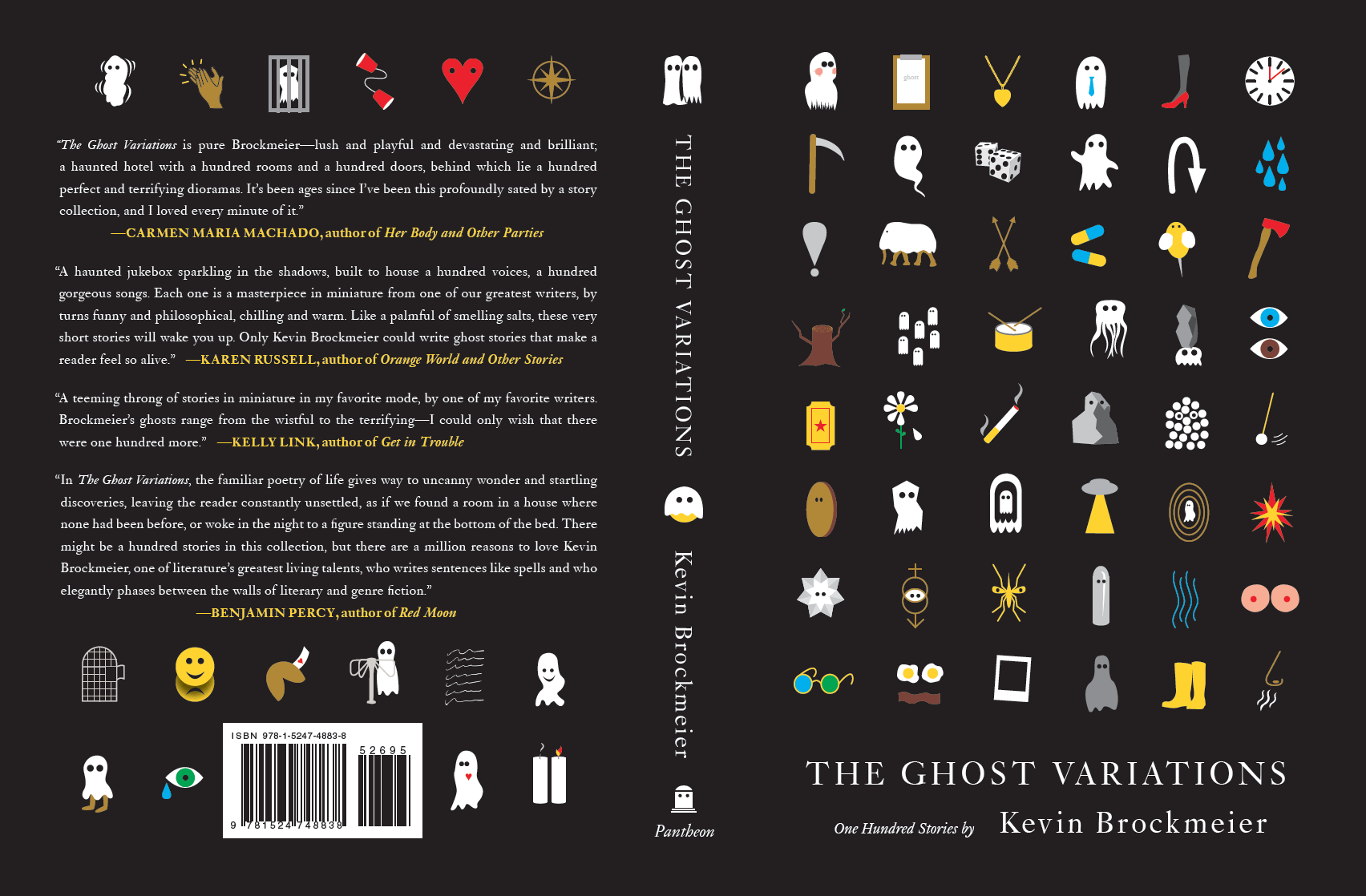The Ghost Variations

Now Available
from Pantheon
The author of the acclaimed novel The Brief History of the Dead now gives us one hundred funny, poignant, scary, and thought-provoking ghost stories that explore all aspects of the afterlife.
A spirit who appears in a law firm reliving the exact moment she lost her chance at love, a man haunted by the trees cut down to build his house, nefarious specters that snatch anyone who steps into the shadows in which they live, and parakeets that serve as mouthpieces for the dead—these are just a few of the characters Kevin Brockmeier presents in this extraordinary compendium of spectral emanations and their wildly various purposes in (after) life.
These tales are by turns playful, chilling, and philosophical, paying homage to the genre while audaciously subverting expectations. The ghosts in these pages are certain to haunt you well after you've closed the book.
“The fantastic elements of his narratives are exquisitely grounded, quickly capturing our attention in the first pages with a sense of intrigue and wonder that invites us to continue exploring these strange, yet strangely familiar, new worlds... From austere and sentimental to cerebral and cynical—and sometimes outright bizarre—the collection’s flash format highlights Brockmeier’s remarkable tonal and stylistic range. Like musical variations whereby material is repeated in altered form, with each literary variation Brockmeier sets out to alter not only the form of the ghost story but the form of his own vast stylistic capabilities.”
—Los Angeles Review of Books
“To Kevin Brockmeier, ghosts are not agents of fear but rather forms of curiosity and longing….But always they offer a strange kind of comfort: Who could ever feel wholly alone in a universe as teeming as this one?”
—The Wall Street Journal
Brockmeier (The Illumination) imagines the vicissitudes of the afterlife and the phenomena that haunt the living in this sonorous collection of 100 brief stories. In “The Office of Hereafters and Dissolutions,” a ghost is hounded by a series of celestial clerical errors. First, he is repeatedly billed an already-paid $25 fee to earn the right to haunt Earth. Then, his birth certificate is postdated by a millennium, and “the genial middle-aged man ceased not only to be but ever yet to have been.” In “Every House Key, Every Fire Hydrant, Every Electrical Outlet,” a toddler sees the faces of the dead in wall sockets. In “Dusk and Other Stories,” a poltergeist communicates with a retired publisher by disturbing books on a shelf with such titles as The Household Spirit. Not every story contains a ghost. The children in “The Sandbox Initiative” are haunted by “the tang of salt air and the blood sound of waves” on oceans they’ve yet to see. In “The Census,” a highlight, Brockmeier imagines God’s alarm at the disproportionate number of ghosts in the world compared to living people, and makes some adjustments, including turning himself into a spirit (“The majority of theologians regard this as His most impressive feat to date,” the narrator wryly concludes). Brockmeier’s luminous sentences and potent metaphors animate the phantasmagorical material. These eloquent dispatches show the writer’s remarkable range.”
—Publishers Weekly
A Mixtape of Ghosts: Karen Russell in Conversation with Kevin Brockmeier (Porter House Review)
I’d love to hear about how this mixtape of ghosts came together. How was the process of writing it different than your other story collections? Are there a lot of angry ghosts on the cutting room floor?
I began with my usual mistake: thinking I had finally wised up and was giving myself an easy assignment. At first, all I knew about the book was that it would be a sequence of one hundred very short stories, each roughly one manuscript page long, and all of them, in one way or another, addressing the idea of ghosts, ghostliness, or the afterlife: a box of candy, I thought, sweet to read and sweet to write. I told myself that I was setting out after pleasure, fun, rather than meaning, and that if I got the pleasure right, the meaning would generate itself. So far, so good. But while I’ve read lots of flash fiction, I had never tried to write it before. I was a total novice, and eventually I realized that the book was making a pretty exacting demand of me—that I teach myself, a hundred times over, not only how to fulfill the particular story I was trying to write but for variety’s sake, and as if from scratch, what a story was.

